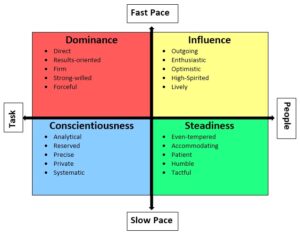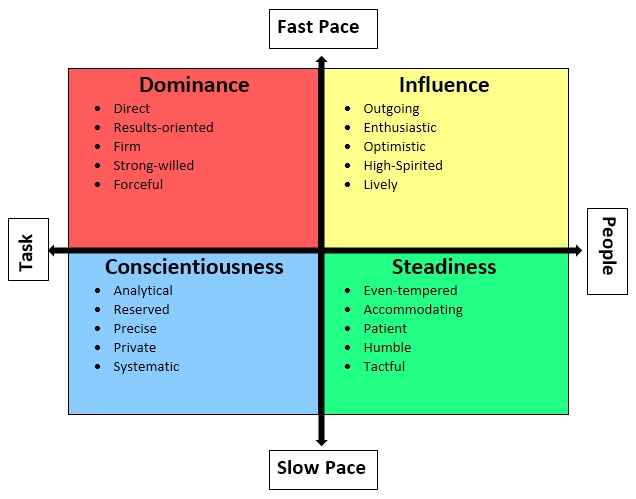Use DISC to:
- understand yourself better,
- improve team dynamics and
- grow sales
Hi-D…Hi-C… I didn’t know if we were talking about vitamins or fruit drinks. I was 30 minutes into a three-day course on people skills and trying to catch up on the conversation.
Brian (a fellow classmate) was explaining one of his customers, “John is so hard to sell to. He never listens, always wants more than what we offer, is always in a hurry, and cuts me off mid-sentence most of the time.” After brief pauses between sentences, Brian went on, “However, John does make a quick decision if he likes what he’s hearing and will buy from us.”
Kelly, boisterously jumped into the conversation, “Sounds like you got yourself a Hi-D there, Brian. Don’t fight it. Just let John run the show and you roll with the punches. Everybody wins! Man, this stuff is great.”
Armed with our new-found psychoanalysis of people into the 4 Quadrants of a DISC Profile, everyone began contributing to the conversation. We offered Brian way more help on how to sell John than he wanted. It was unanimous, we all decided John was a D, which stands for Dominance. And no, it doesn’t stand for anything else that you might think of people in this quadrant.
The interesting part came when we were told Brian’s profile. While obvious to us, Brian confirmed that he was an “S”, which stands for Steadiness. Which happens to be the opposite of a D in many ways and explained a lot about why Brian was struggling to connect with John.
It would take longer than a blog to explain DISC but let me give a very brief understanding. Dating back as far as the Greek Philosopher days, it was determined that people sort into four basic personality styles. In the 1920’s, Dr. William Marston came up with the titles for the four categories of DISC and how to sort people into them. Fun Fact: Old Bill Marston was also the guy to come up with the Lie Detector Test and the Wonder Woman cartoon. I can’t imagine the profile it takes to create those three very different things.
Anyway, with the technology of online assessments over the years, we can now get a DISC profile by answering a series of questions. The remarkable part of this assessment is the accuracy. The questions don’t seem to make sense, but the report you get is uncanny. If you haven’t completed one, you will be shocked at how close they come to telling you about your work habits, your pace, what you need to succeed, what bothers you in the workplace, how you act under stress, and the list goes on.
The scale rates you on two variables:
- Pace: Fast versus Slow
- Focus: People Versus Task
From there it gives you the levels of your profile.
 While there is much more detail to go into on DISC and implementing it, this gives you a very basic idea.
While there is much more detail to go into on DISC and implementing it, this gives you a very basic idea.
Why is it so important? There are three primary uses for DISC and why I think every person, salesperson or not, should go through the assessment.
- Self-Awareness: This is the first thing achieved when you get your results back. You jump in and try to read all the specific character traits they assess of you. Like me, you will feel some are accurate and some are not. Take a brief moment to hand your results to your spouse and see what he or she says. Like my experience, my wife confirmed 100% accuracy of the report, despite my protest that I wasn’t an off the chart D/C. I throw the C at the end to make it seem like I’m not such a D. We sometimes get a bad reputation. FYI: We get that bad reputation while we are getting a lot of things done (and checking it off our lists).
- Team Dynamics: The second most important reason to go through DISC is the improvement in team dynamics that takes place. No longer do you think Betty is mad at you. Now you know she is a “C-Conscientious” and needs more time and information before granting you a capital expenditure. After all, Betty tells you, “We have a process around here?” Then turns abruptly and walks to her office. No schmoozing for her. She gave you the information and that’s it. Again, instead of thinking she’s a jerk, you realize that’s just her communication style and she feels very comfortable with what she said and how she left it with you.
- Customer Dynamics: This is where the sales team really captures the value of this training. While you don’t know for sure what your customer’s DISC Profile is, you can make a very educated guess after going through the training. Similar to your interaction with Betty, you now have a clearer understanding of why a customer behaves in a certain way. Now, you can structure your sales calls for the individual customer based on their profile. The change in your ability to connect with them, get the information they need to make a buying decision and have deeper engagement will amaze you.
In closing, I want to point out a critical component of DISC. While it is a self-assessment and gives you an understanding of your personality profile, please understand that it is not an excuse. By that, I mean, it does not give you an excuse for being a jerk or procrastinating or not completing your weekly report. I’ve had people go through the course and say, “See Greg, I don’t fill out my CRM reports because I’m an “I” and we don’t like detail.” Sorry, not a good enough excuse to be a real reason. And if you are in a leadership position, don’t be like one manager I knew that came back and lined up his staff. He informed them that he was a High D profile and gave them instructions on how to communicate with him.
That’s not what this is about. It’s about you understanding how you can interact and connect better with the people around you. You don’t have to change who you are, but you do have to understand how it creates perceptions of you and how others react to you. In a selling situation, I talk about working from the center of the crosshairs. That means, you channel your style and start your selling process based on where your customer is. In one of my coaching sessions, I was riding along with Kevin (a High I). The first sales call took two hours! And we only got through one of the three topics we planned on covering with the customer. Watching the customer (a D style person) squirm in his seat as the conversation went on and on, I finally tried to bring the call back on track. Afterward, in the car ride home, I asked Kevin about how long the sales call went and how disorganized it seemed to the customer. “Oh, my customers know me, Greg. They always say That’s just Kevin!”
Epilogue: One of Kevin’s complaints was getting appointments with customers. I wonder why. That’s another story for another day on how we pieced those two things together on the drive from Dubuque to Madison
There are a lot of different assessments out there and I think many of them are great. DISC is the base for all the others. It’s step one in the self-development journey that you are on. Mostly, because you can use it on yourself as well as with others. Myers-Briggs, Strength Finders, etc. are good as well. However, they get a little more difficult to use the information with other people unless they tell you their profile.
Final note: While I must reveal that I sell DISC and a few other assessments, and would love to sell you one of them, please understand there are plenty of places out there that offer them. The important part is that you become familiar with them and have someone explain how to use them. If that’s me, Great! If not, well, I can’t lie- that’s not great! Just kidding but do get started.
If you enjoyed today’s blog or previous weekly blogs, please share it with someone you know that might benefit from it. The best part is it’s free, it’s good and I don’t spam your inbox (much).
For more information on completing your DISC Profile, contact me at Greg@GregMartinelli.net (608) 751-6971
Make your next meeting memorable by bringing in a speaker who’s been there. Contact me to find out how:
Greg@GregMartinelli.net (608) 751-6971
For more Ag Sales Training, Ag Sales Coaching and Leading Ag Sales Teams, go to http://www.GregMartinelli.net/




